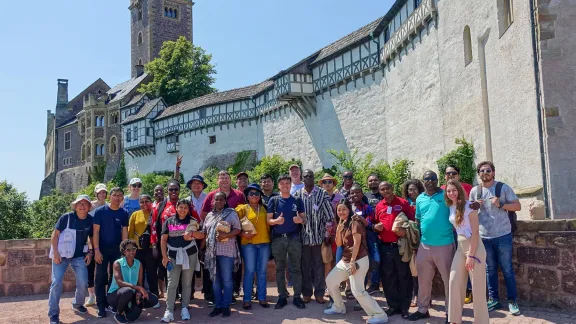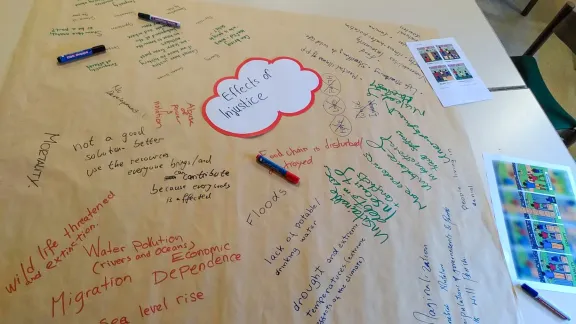
Participants of the 2024 summer school by Mission EineWelt during a visit to Wartburg Castle where the Reformer Martin Luther translated the New Testament into German. Photo: LAC
International summer school in Germany offers opportunities for sharing, learning and networking
(LWI) - “We didn’t approach climate justice in theory only,” said Rev. Dr Sung Kim, Lecturer at the Global Education Department at Mission EineWelt, the Center for Partnership, Development and Mission of the Evangelical Lutheran Church in Bavaria, Germany. “It was about a communion of 30 people actively engaging with global justice and climate issues. And it worked: The two weeks from July 13 to 28 led to unexpected and impressive results.”
Kim and his team organized the international summer school on the theme’ Climate justice in our churches and schools.’ The school brought together men and women, lay and ordained, from 21 countries and various professions and backgrounds—from students and young professionals to activists and retired persons working as volunteers. “This diversity was our strength,’ said Kim, “as it allowed us to approach the topics from many perspectives.”
Sharing regional perspectives on climate justice
Participants presented case studies from their respective regions, vividly illustrating the unequal distribution of climate impacts, particularly affecting disadvantaged and vulnerable populations. These presentations highlighted the unique realities and challenges people in different regions face. However, they also showcased how churches are actively mitigating climate impacts or adapting to climate change.
In Malaysia, the church addresses climate justice by supporting small farmers to adapt their production methods, committing to environmental work with youth to facilitate access to alternative energy sources, and seeking ways to educate their congregations.
In Tanzania, women work to integrate vulnerable families into urban environments and facilitate access to education for these families.
In Singapore, churches are fighting against rising sea levels alongside various civil society organizations and the government.
In several countries in Latin America, churches support small farmers and promote reforestation and agroecology, while in Germany, they aim to reduce the carbon footprint of their churches and facilities.
Discussions also covered international agreements, the role of the economy and political measures to promote climate justice.

Reflexions of a group session on “justice” during summer school. Photo: LAC
“It makes such a difference to listen to personal accounts from the people themselves,” said Lenis Gisel Gonzáles from the Christian Lutheran Church of Honduras (ICLH). “Time is running out fast, and we must work through actions, no longer just with information”.
Field trips and visits to climate initiatives in the German context were also part of the program. That included the Vitopia community near Magdeburg, striving for a climate-friendly and sustainable lifestyle, and a city tour of the “Just, sustainable and ecological Nuremberg.”
Being part of a global Lutheran communion
Strengthening connection to the Lutheran communion was another focus of the summer school. Daily devotions and church services with local congregations set the tone for each day. Bible studies, primarily taken from the books of the prophets, centered around “justice.”
A “Luther route” took participants to the historic Reformation sites in Wittenberg, Wartburg Castle, Erfurt and Magdeburg. In Wittenberg, the summer school participants visited the LWF Center Wittenberg, which offers several seminars and training courses for lay and ordained Lutherans every year. At the Luthergarten, participants experienced the living, international, and ecumenical monument for the 2017 Reformation anniversary comprising 500 trees planted by representatives of different churches worldwide.
Jorge Weishein, pastor of the Evangelical Church of the River Plate who works with the Fundación Hora de Obrar, noted: “The moment of prayer beneath the Heaven’s Cross in the center of the Luthergarten was moving. It made me realize that being Lutheran means being ecumenical. The trees in the Luthergarten represent the global connection and diversity of the churches.”
During a final reflection concluding the summer school, participants emphasized how the intensive thematic discussion of climate justice had opened their eyes and ears to the perspectives and questions of others: “We can join hands advocating for climate justice in words and deeds!”
“The 2024 summer school by Mission EineWelt was a good example of what it means to not only think about justice in theory but also to experience how we can take action together,” reflected Kim. “It promoted an understanding of the global challenges of climate change and the importance of justice and solidarity in dealing with them.”
The 2024 summer school was a good example of what it means to not only think about justice in theory but also to experience how we can act together.
Rev. Dr. Sung Kim, Lecturer at the Global Education Department at Mission EineWelt


